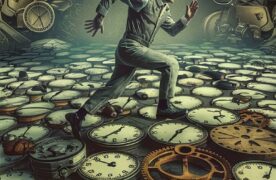Some sectors of capitalism and of the far right propose the promotion of new forms of fascism, favouring general repression and eliminating any sort of bourgeois democracy. Big capital does not fear new fascism as it does not stray from the fundamental principles of capitalism. At a global level, the panorama is one of uncertainty.
 Juan Diego García
Juan Diego García
The right’s advances are not yet complete, just like the triumphs of the far right. Nor can the social and political forces of the left be considered completely eliminated. The current panorama is a scenario loaded with uncertainties which, in general, always feed catastrophism.
Some evidence could help to clear this horizon of uncertainties. The neoliberal model has been a complete failure, at least if the principal promises of its ideologues are considered, according to which there would be an economy without crises, a social order of full political freedoms and a culture of generalised optimism, all the result of free competition which would result in happy individuals, always as the fruit of personal effort.
The 2008 financial crisis – still not overcome – put paid to the optimistic predictions of neoliberal ideologues.
The market’s supremacy and the relegation of the state to a minor body, simply in a policing role, has shown the need for public entities of enormous strength.
 Entities which – in the least savage version of capitalism – control, even if only partially, the productive sphere and orient its social impact and nature.
Entities which – in the least savage version of capitalism – control, even if only partially, the productive sphere and orient its social impact and nature.
The extension of the neoliberals’ “full freedom” in the international sphere (“globalisation”) brought large benefits to certain sectors of capitalism (especially to the metropolitan countries) but it has ruined thousands of small and medium-sized enterprises unable to bear the excessive competition.
On the other hand, there is the economic impact the current Technological Revolution (cybernetics and so on) is having on businesses, since it requires enormous investments if they want to maintain their positions in the local and world markets.
In contrast China, which has maintained an iron state control of the economy (as has India to some extent), offers a very favourable outcome and is on the brink of becoming the planet’s number one economy (if it isn’t already, in many respects).
 The neoliberal model has meant huge profits for some business sectors and for metropolitan countries (Europe and the United States, particularly). Conversely, in rich countries the neoliberal model affects negatively broad swathes of business, sections of the so-called middle and salaried classes and – dramatically – large groups of the population. In these countries there is relative and absolute poverty among people who lack the essentials for a normal life. The deterioration of traditional public services (health, education, pensions, social care etc) and the deep deterioration of working conditions affect broad sectors of the population in the metropolises. This creates a certain relative poverty which isn’t compensated for by the mechanisms of the market (private education and health, for example).
The neoliberal model has meant huge profits for some business sectors and for metropolitan countries (Europe and the United States, particularly). Conversely, in rich countries the neoliberal model affects negatively broad swathes of business, sections of the so-called middle and salaried classes and – dramatically – large groups of the population. In these countries there is relative and absolute poverty among people who lack the essentials for a normal life. The deterioration of traditional public services (health, education, pensions, social care etc) and the deep deterioration of working conditions affect broad sectors of the population in the metropolises. This creates a certain relative poverty which isn’t compensated for by the mechanisms of the market (private education and health, for example).
In the periphery countries the neoliberal model’s effects are more dramatic and have expelled millions of people towards the metropolises.
The destruction of the modest local business fabric (unable to compete with foreign supply) and the most criminal forms of rivalry that exist between metropolitan cities for control of markets and commodities lead to direct or indirect military interventions and make millions of people flee to Europe or the United States. In contrast, the Chinese model has made an increase of its industrialisation possible, fomenting vast internal migration from the countryside to the cities (it is said that close to 400 million peasants have migrated in recent decades) with a noticeable improvement in their standard of living.
But certainly the neoliberal model is not just a way of managing the economy.
 The reduction of the traditional state and its replacement in key areas by private enterprise translates into a huge diminishing of traditional forms of government. For example, the political institutions, which were never completely independent of capital but had a certain amount of power to palliate the harshest effects of the exploitation of the workforce.
The reduction of the traditional state and its replacement in key areas by private enterprise translates into a huge diminishing of traditional forms of government. For example, the political institutions, which were never completely independent of capital but had a certain amount of power to palliate the harshest effects of the exploitation of the workforce.
On the other hand, the so-called welfare state, as the most democratic form in decision-making and in the management of public affairs, had gained broad social support in the metropolises (and in some periphery countries). This model – above all in Europe – has seen itself reduced to almost nothing by neoliberalism. And this is one of the main reasons behind the current political crisis and the discrediting of the institutions, the political system, the parties, parliament and the state itself.
What was called “social Darwinism” to highlight tendencies towards fierce individualism has become the very essence of the neoliberal model.
For such a doctrine, everything depends on the individual, on personal effort.
 If there is any lack of success, the blame falls squarely on the person. This cultural message is shared by the traditional right and seeks to justify opposition to any form of social solidarity.
If there is any lack of success, the blame falls squarely on the person. This cultural message is shared by the traditional right and seeks to justify opposition to any form of social solidarity.
The bourgeoise, as a whole, seems to be torn between two alternatives. Faced with the neoliberal model’s failure (undeniable) the most sensible sectors would favour at least partially remaking the welfare state in some way in the metropolises with an appropriate version on the periphery of the world system.
They put up with social pressure and great discontent, but they have the advantage of not having to face a leftist force that obliges them to make concessions. Social discontent, due to its very spontaneity, without a solid organisation to guide it, is not enough when it comes to negotiating reforms to capitalism.
(Translated by Philip Walker – Email: philipwalkertranslation@gmail.com) – Photos: Pixabay












.jpg)












